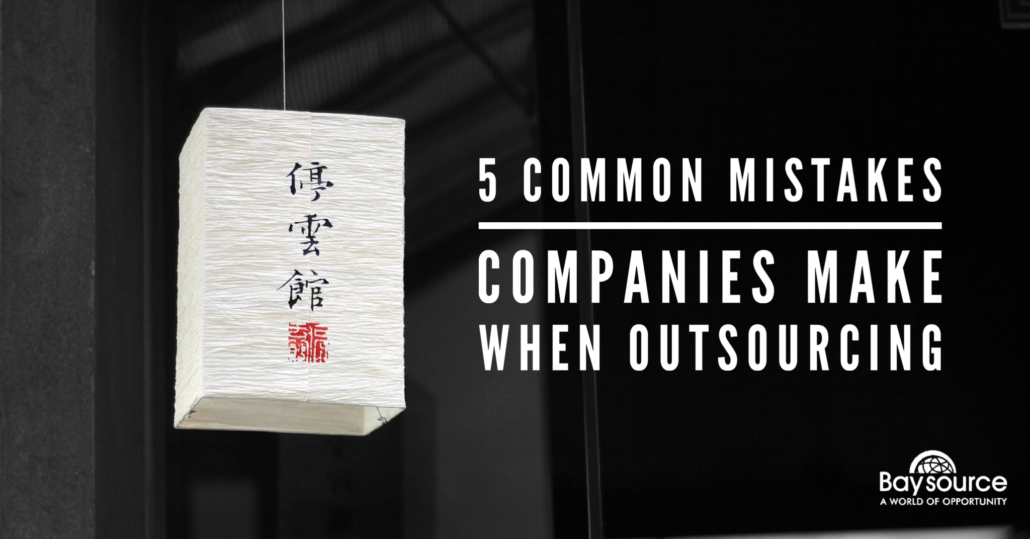5 Common Mistakes Companies Make When Outsourcing
Any business, no matter its size or structure, can potentially benefit from outsourcing some of its work to specialists or contractors, rather than taking on the full workload in-house. Outsourcing projects and labor can cut costs and give you the time and competitive advantage you need to outshine competitors. However, many businesses jump in too quickly, making mistakes that cost them their time, customer relationships, and damage their reputation.
Outsourcing done right can make a huge impact on your bottom line. Here is what you need to avoid, and what to do instead:
1. Not making your objectives clear.
A healthy relationship with an outsourced contractor must begin with clear communication. Your contractor can’t deliver quality work if you do not give them detailed instruction and expectations for the work. Many small businesses become disappointed with their outsourcing partners because communication is not transparent in the beginning. Before you sign a contract with an outsourcing partner, you should both agree on the following:
-
- A schedule of productivity and deadlines, as well as how lenient these deadlines are
-
- How progress will be reported and how you’ll give feedback
-
- Your payment plan and schedule
- Your communication expectations
2. Trusting your outsourcing partner too little or too much.
To make the relationship with your outsourcing partner a positive one, you need to build trust over time. Skipping steps in your professional relationship, or holding the reins too tightly can lead to conflict and poor results long-term. In the beginning, you will likely try to micromanage your projects, checking in too often and not giving the contractor the space and time to work effectively. However, you need to give them some freedoms in order to see what they are capable of, and actually see the time and cost-savings that are possible with an outsourced contractor.
If you’re happy with their work, it may be tempting to give the contractor more; but, remember that you need to work with the strategy you agreed upon in the beginning. Not everything should be outsourced, and adding more to the contractor’s workload may put a strain on your professional relationship.
3. Skipping the interview process
Some small business owners choose the first outsourcing company they find without asking the right questions. You need to interview candidates and choose ones that:
-
- Can communicate properly with your team (for example, you shouldn’t work with a company that has a different primary language than yours or doesn’t have a strong infrastructure for digital communications)
-
- Has strong reviews or referrals from previous and current clients
-
- Has the available work hours that you need
-
- Understands and meshes well with your company values and culture
- Is cost-effective for your goals, but doesn’t sacrifice quality
Cultural differences may impact your working relationship; but, you may not realize this until you meet face-to-face or on the phone with the contractor. A personal interview with each candidate will help you identify strengths and potential weaknesses in the relationship, and help you choose the right company for your outsourced work.
4. Outsourcing functions that directly impact the customer
If you’re going to outsource, the best places to start are in your internal operations and product development. You can outsource customer service and sales; but, this may impact your brand image and gives you less control over the customer experience.
Of course, every part of your business operations impacts the customer in some way, yet you want to be careful about allowing another company to be a point of contact for your customers.
5. Not creating an exit strategy
What happens if the outsourcing company you choose isn’t all you dreamed it would be? Perhaps you overestimated the cost savings or they can’t deliver everything you agreed upon. They may even go out of business, which puts you at a severe disadvantage, and a time crunch to replace them. Whether you’re hiring a single freelancer or an entire outsourced manufacturer, you need to have a clear and cordial exit strategy in case the relationship no longer works.
With the right partnership of a China sourcing agent and goals in mind, outsourcing can be a great benefit to your business. The hardest part is finding the right resources, especially if you are looking overseas. Working with a business development and outsource manufacturing partner, Baysource Global, makes this process streamlined and transparent. We connect you with leading manufacturers and distributors worldwide to help your business grow.
To learn more about Baysource Global’s services and our commitment to client success, click here.


Follow Us